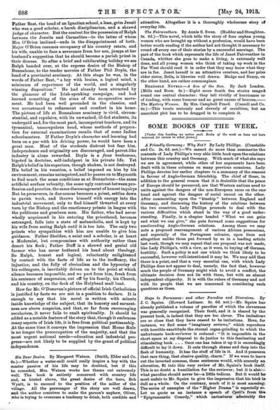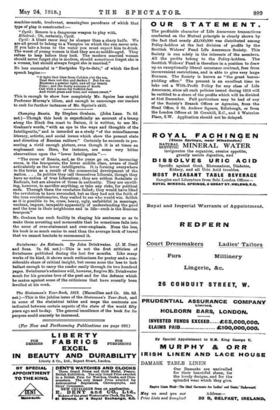Steps to Parnassus : and other Parodies and Diversions. By -
J. C. Squire. (Howard Latimer. 3s. 6d. net.)----Mr. Squire has• already published a volume of parodies of which the cleverness- was generally recognized. Their fault, and it is shared by the present book, is indeed that they are too clever. The imitations are so close that they have ceased to be imitations. Here, for instance, we find some "imaginary reviews," which reproduce with horrible exactitude the eternal organ-grinding to which the unfortunate hack-reviewer is reduced : "It is impossible in the short space at my disposal to do justice to this fascinating and stimulating book. . . . Once one has taken it up it is exceedingly difficult to lay it down. It cuts through shams and deep into the' flesh of humanity. It has the stuff of life in it. And it possesses that rare thing, that elusive quality, charm." If we were to leave out the inverted commas, these sentences would, with scarcely an alteration, St into this very review of Mr. Squire's book itself: This is no doubt a humiliation for the reviewer; but it is also— what parodies should never be—a little tedious. But it would be. most unfair to Mr. Squire to give the impression that his bOok isF dull as a whole. On the contrary, much of it is most amusing: The series of examples of the "Higher Drama" is especially so. Let us quote as an instance a speech of Cyril's from the " Epigrammatic Comedy," which caricatures admirably the machine-made, irrelevant, meaningless parodoxes of which that type of play is constructed:— "Cyril: Reason is a dangerous weapon to play with. Ethelred: Oh, certainly, Cyril.
Cyril: A blunt razor may be sharper than a sharp knife. We are all proud to belong to a Vampire on which the sun never sets. If you take a horse to the water you must expect him to drink. The worst of young women is that they are so middle-aged. They refuse to leap before they look. Tho modern married woman should never forget she is modern, should sometimes forget she is a woman, but should always forget she is married."
No less successful is "Euripides Up-to-date," of which the first speech begins:—
" 0 light that blew from Colchis o'er the sea, Dost thou not dim and darken ? But for me Blossoms a greater light, and all my breath Pales ; and the dusty avenues of death Call with a haven for fulfilled feet
And violet grass and trees and waters sweet."
This is enough to show how completely Mr. Squire has caught Professor Murray's idiom, and enough to encourage our readers to seek for further instances of Mr. Squire's skill.











































 Previous page
Previous page